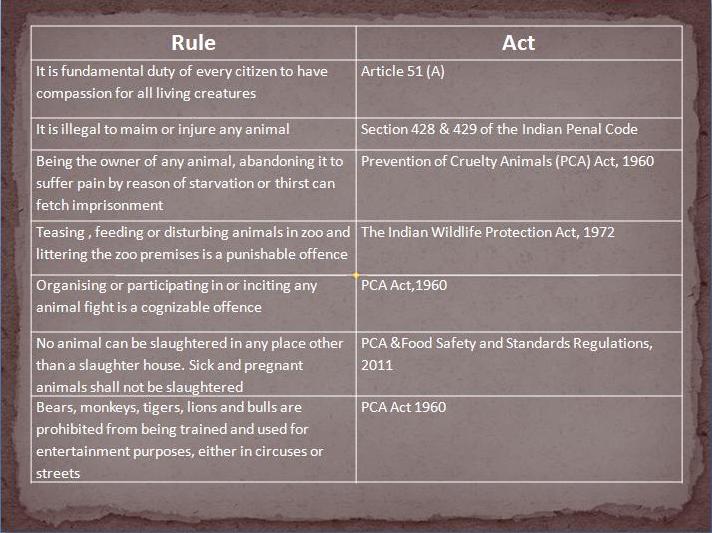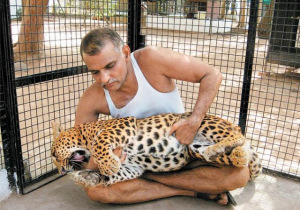“The greatness of a nation is judged by the way it treats its animals,” believed Mahatma Gandhi. He played a crucial role in freeing India from the clutches of the British rule and giving the country an ‘independent status’. Far from his vision of greatness, animals of India however are still struggling to experience their freedom to live.
Long before animal activism became a global movement, animal laws were enacted in India in their present form. According to Article 51A (g), it is fundamental duty of every citizen to have compassion for all living creatures.
Contradicting the law, the recent series of incidents tell a different story all together. A disturbing trend has been making headlines these days. Mute animals are tortured to death, videos of this torture are recorded for the sake of publicity.
 As evident the rules are very exhaustive in nature and encompass about every gamut. The disappointing factor is the implementation and conviction of the defaulters and perpetrators of the crimes committed against animals both wild and domestic. This facet requires both awareness and ensuring timely reporting followed with conviction.
As evident the rules are very exhaustive in nature and encompass about every gamut. The disappointing factor is the implementation and conviction of the defaulters and perpetrators of the crimes committed against animals both wild and domestic. This facet requires both awareness and ensuring timely reporting followed with conviction.
India is a country of contradictions. Our cultural practices comprise of treating animals in various forms of God, worshipping them and conversely also include beheading and sacrificing them to appease the same God.
The division of religious beliefs has also led to the phenomenon of vigilantism, which has acquired dangerous proportions. Example being Dadri, which led to lynching of Mohd Aklaq and killing of cattle traders in Jharkhand. Ironically, the cow is still not safe at the hands of their protectors. A case in point is a government run goshala in Hingonia, Rajasthan where over 500 cows died due to neglect and starvation after employees went on a strike.
For our entertainment we have always resorted to the animal kingdom. The practice of shikar by the royals of yester years followed by the British Raj just about made the tigers extinct. The zoo is the next place where the wild animals are kept in the confines of a cage away from their natural habitat with no chance for social interaction with others of their own kind.
Circuses go a notch higher where animals are simply tortured into submission. It is sad to see the king of the jungle relegated to stature even below that of a cat, subdued into performing to the fancies of the trainer.
Cockerels are used in cockfighting where blades are tied to their legs and they fight out to their blood-spattered and painful death. Even the man’s best friend is not spared at the hands of the humans. The blood sport has dogs set on each other to fight till their death or be maimed for life. The tradition of bull sport in Tamil Nadu called Jallikattu leads to severe injuries to the bulls.
The human race has always been driven by boundless desires to possess the exotic. This greed has led to the near extinction of some species of animals like the musk deer for perfumes and minks for their fur among many others.
Perhaps the most absurd cruelty inflicted on animals is to subject them to horrific tests to ensure the product is safe for human beauty. These tests drive animals to suffer a long painful existence till death. The same goes for the medical industry where animals are subject to testing by injecting them with viruses and then working on the antidote.
Being sensitised by such issues, various companies are coming forward. They are adopting ways either less painful for animals or are avoiding use of animals completely. The Body Shop, a beauty products brand has promised to serve products not tested on animals. Well-informed and responsible consumers have welcomed the change.
While a lot wrong is done to animals, many in our country shimmer as sunshine of hope. The Bishnoi community of Rajasthan has stood as true bastions of protectors of the wild life and the frail environment of the Thar Desert. Members of Bishnoi community exhibit the true testament of human spirit in terms of animal conservation and respect for nature. Their villages are always teeming with deer which they protect over their own lives. The villages have a wide range of animals including deer, chinkara and nearly extinct- black buck feeling secure in a human settlement.
“These days, people enjoy harming and killing animals to show off among their friends. This sadist mentality shows the lack of compassion in people. Children from young age need to be sensitised to nurture environment and animals,” said Dr Prakash Amte, popular social worker known for his works on equality and animal rights.
 Amte lives amidst a variety of animals including many wild creatures. “We have many carnivorous animals like leopard, crocodile, bear, hyena and snakes among many others. All of them live together cordially. My grandchildren play with them. These animals are known being fierce but as long as humans don’t instigate them, they are harmless.”
Amte lives amidst a variety of animals including many wild creatures. “We have many carnivorous animals like leopard, crocodile, bear, hyena and snakes among many others. All of them live together cordially. My grandchildren play with them. These animals are known being fierce but as long as humans don’t instigate them, they are harmless.”
In a bid to promote animal conservation in the corporate space, zoos have initiated adoption of animals by companies under corporate social responsibility (CSR). Many firms and individuals are adopting wild animals to conserve them. “It is good that animals are adopted but this shouldn’t be limited to providing only food; animals should be provided with the natural habitat they require. When adoption is blended with involvement, the case becomes an inspiration for others, further spreading the goodness of compassion,” Amte added.
Nature has given all living beings equal right to live. This right for animals needs to be acknowledged and respected in totality. From industrial and corporate functioning to encounters of common man with animals, their existence needs to be revered. While companies may pump money to save lives of animals, adopt them and make changes in their operations to be animal-friendly, it becomes utterly important for citizens to be compassionate to animals and let them live if they cannot be loved.
(With Inputs From Ishita Singh)
Thank you for reading the story until the very end. We appreciate the time you have given us. In addition, your thoughts and inputs will genuinely make a difference to us. Please do drop in a line and help us do better.
Regards,
The CSR Journal Team


